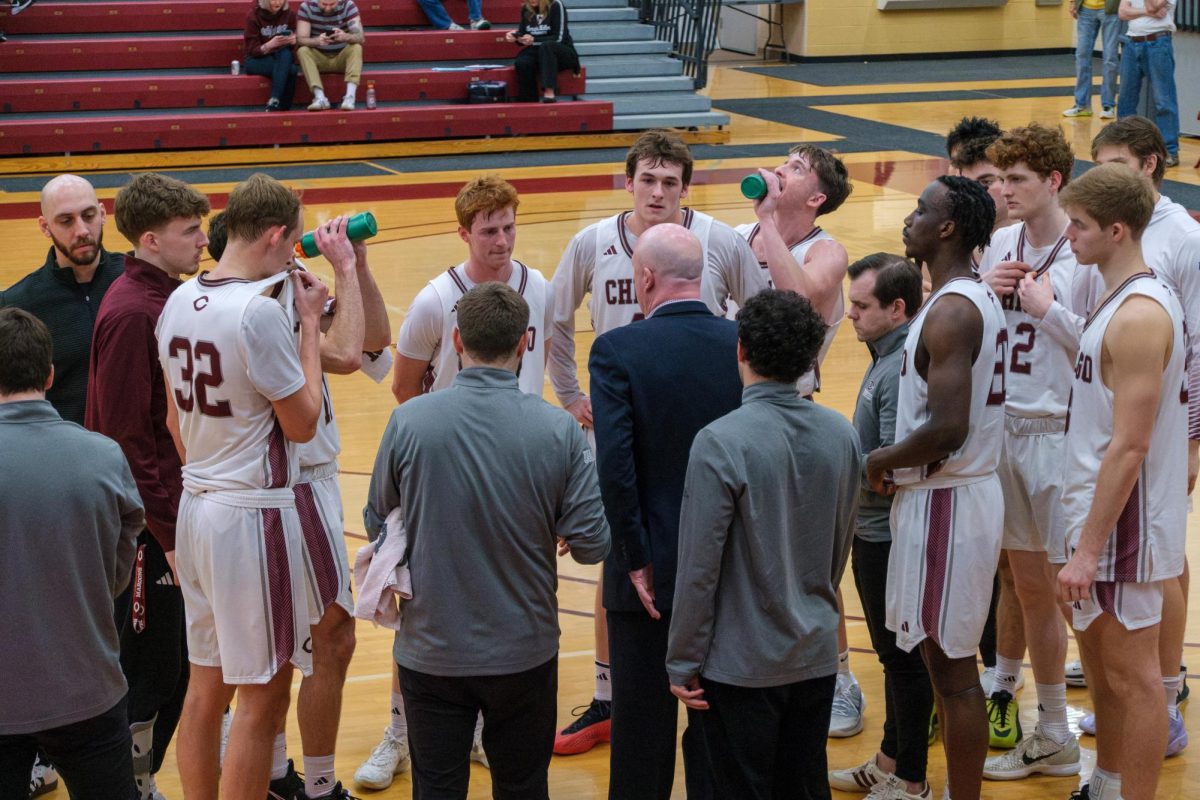Track and field may effectively be a coed program at Chicago, but the women clearly set themselves apart on Saturday. While they churned out performances that merited kudos and optimism about the meets to come, their counterparts on the men’s team produced an overall showing that was noticeably uneven.
The Chicago Duals at Henry Crown acted as the beginning of what could be a phenomenal season for the women’s team. At a meet in which individual teams compete directly with each other instead of fighting for overall rankings, the women (5–2) managed to best every team but North Central with solid performances from all corners of the squad. The men (3–4–1) went 3–3–1 against the opposition. Their shakier record resulted from the bulk of their quality finishes coming from the distance portion of the team, while sprints and field events were only able to deliver one top-three performance.
For the women’s cause, fourth-year Jessica Winter produced a victory in the 800-meter run, breaking the tape in 2:18.87 to sail into the top spot. Although Winter does not specialize in the 800-meter run, her time on Saturday missed the NCAA’s provisional qualifying standard by just .8 seconds.
“I can’t say we’re really concerned with qualifying her in that event,” head coach Chris Hall said. “She could, of course. But she’s going to really dominate in the mile and that’s what we’re concentrating on.”
While Winter tore it up on the track, the women’s jumpers went to work as first-year Olivia Ndyabagye (5.29 meters) easily took first place in the long jump and second-years Aparna Hirve (first/10.96m) and Somayeh Jahedi (second/10.31m) dominated the triple jump. The women’s distance medley repeated their impressive January 21 Chicago Invitational performance as first-years Alexandra Robertson, Lauryn Nwankpa, and Maggie Costich, with second-year Danae Roumis running the anchor leg, pulled off a swift 13:20.65 showing. The quartet once again faced virtually zero competition, as second-place finisher Loras’s anchor was 200 meters back when Roumis crossed the line.
The women earned the rest of their points from second- and third-place finishes supplied by Robertson (second/2:25.48) in the 800, second-year Hannah Moots (second/11:15.25), fourth-year Annie Sanders (third/11:26.82) in the 3,000-meter run and third-year Vidthya Abraham, who pulled off a gut wrenching final 50-meter sprint to cinch third place in the mile with a time of 5:19.38.
Cynthia Lin delivered a particularly promising second-place finish in the 200-meter sprint. Lin not only contributed to the final score, but also balanced the team’s overall performance with a solid finish in a short sprint. Lin’s 200-meter victory is the beginning of a trend that will consistently produce quality performances all around and continue into the outdoor season after the first-years have gained collegiate competitive experience and with the return of second-year sprinting sensation Nofi Mojidi from her basketball-induced sabbatical.
Unlike their compatriots, the men’s team yielded an uneven performance, relying on the distance contingent to supply almost all of the day’s must-see races. Second-year Zach Rodgers provided the only top-three finish in a non-distance race, hurdling 55 meters in 8.17 seconds to take third place. All other notable performances prominently featured third-year national provisional qualifier Emil Bojanov.
Opening the men’s distance medley, Bojanov’s breakneck 1,200-meter leg earned the Maroons an early lead. The competition proved to be a little more robust than they seemed at first, as the Maroons were slowly pushed back to sixth place during third-year 400-meter leg Matt Kolbe’s and third-year 800-meter leg Mark Roualet’s sojourns around the track. Fourth-year Pat Hogan’s swift 4:32.95 mile leg thrust the Maroons ahead for a 10:31.87 third-place finish.
Bojanov toed the line for a second time in the half-mile, going head-to-head with 2005 Ohio high school 800-meter state champ Ohio Northern first-year James O’Brien. A leisurely start trapped Bojanov in the middle of the pack, but a well-timed surge forward moved him comfortably to the forefront halfway through the race. In the end, Bojanov was unable to hold the 11th-hour 150-meter sprint that propelled O’Brien into first. Bojanov crossed the line in 1:58.15, relegating him to third place.
“I went out a little slow,” Bojanov explained. “It’s such a small meet, though. It doesn’t really matter.”
Bojanov, like the remainder of the team, is focusing on next Saturday’s UW–Whitewater Invite, where the Maroons have traditionally had several national qualifiers.
“Whitewater has been and continues to be a really outstanding meet,” Hall said. “It’s the who’s who of Division III track in the Midwest. Generally with the best competition, we deliver our best performances and hopefully qualify a few for the national meet.”








